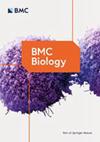早期抑制 BRD4 可通过加速 rDNA 动态表达促进 iPSC 重编程
IF 4.4
1区 生物学
Q1 BIOLOGY
引用次数: 0
摘要
iPSC 重编程技术在临床治疗、疾病建模、药物研发和其他各种应用领域大有可为。然而,这项技术的广泛应用却遇到了效率低下、程序冗长和生物过程不明确等障碍。因此,为了改进这项技术,深入研究 iPSC 重编程的内在机制具有重要意义。BET蛋白BRD4在重编程的后期阶段起着至关重要的作用,但它在早期阶段的确切功能仍不清楚。我们的研究旨在调查 BRD4 在 iPSC 重编程早期阶段的作用。我们的研究发现,早期抑制BRD4可大幅增强iPSC重编程,而在中后期抑制BRD4则会阻碍重编程过程。在重编程过程中,核糖体DNA的表达先增加后减少,然后逐渐恢复。早期抑制BRD4可分别改善早期和中后期rDNA表达的下降和恢复。此外,我们还揭示了BRD4在整个重编程过程中调控rDNA转录的机制。具体来说,BRD4与UBF相互作用,并共同定位在rDNA启动子和增强子区域。最终,BRD4通过促进周围染色质中组蛋白H3赖氨酸27乙酰化的富集来促进rDNA转录。此外,我们还发现,早期抑制BRD4可促进细胞脱离体细胞状态,激活多能基因。总之,我们的研究结果表明,早期抑制 BRD4 可促进 rDNA 的连续动态表达,从而提高 iPSC 重编程的效率。本文章由计算机程序翻译,如有差异,请以英文原文为准。
Early inhibition of BRD4 facilitates iPSC reprogramming via accelerating rDNA dynamic expression
iPSC reprogramming technology exhibits significant promise in the realms of clinical therapeutics, disease modeling, pharmaceutical drug discovery, and various other applications. However, the extensive utilization of this technology has encountered impediments in the form of inefficiency, prolonged procedures, and ambiguous biological processes. Consequently, in order to improve this technology, it is of great significance to delve into the underlying mechanisms involved in iPSC reprogramming. The BET protein BRD4 plays a crucial role in the late stage of reprogramming; however, its precise function in the early stage remains unclear. Our study aims to investigate BRD4’s role in the early stages of iPSC reprogramming. Our investigation reveals that early inhibition of BRD4 substantially enhances iPSC reprogramming, whereas its implementation during the middle-late stage impedes the process. During the reprogramming, ribosome DNA expression initially increases before decreasing and then gradually recovers. Early inhibition of BRD4 improved the decline and restoration of rDNA expression in the early and middle-late stages, respectively. Additionally, we uncovered the mechanism of BRD4’s regulation of rDNA transcription throughout reprogramming. Specifically, BRD4 interacts with UBF and co-localizes to both the rDNA promoter and enhancer regions. Ultimately, BRD4 facilitates rDNA transcription by promoting the enrichment of histone H3 lysine 27 acetylation in the surrounding chromatin. Moreover, we also discovered that early inhibition of BRD4 facilitates cells’ transition out of the somatic cell state and activate pluripotent genes. In conclusion, our results demonstrate that early inhibition of BRD4 promotes sequential dynamic expression of rDNA, which improves iPSC reprogramming efficiency.
求助全文
通过发布文献求助,成功后即可免费获取论文全文。
去求助
来源期刊

BMC Biology
生物-生物学
CiteScore
7.80
自引率
1.90%
发文量
260
审稿时长
3 months
期刊介绍:
BMC Biology is a broad scope journal covering all areas of biology. Our content includes research articles, new methods and tools. BMC Biology also publishes reviews, Q&A, and commentaries.
 求助内容:
求助内容: 应助结果提醒方式:
应助结果提醒方式:


